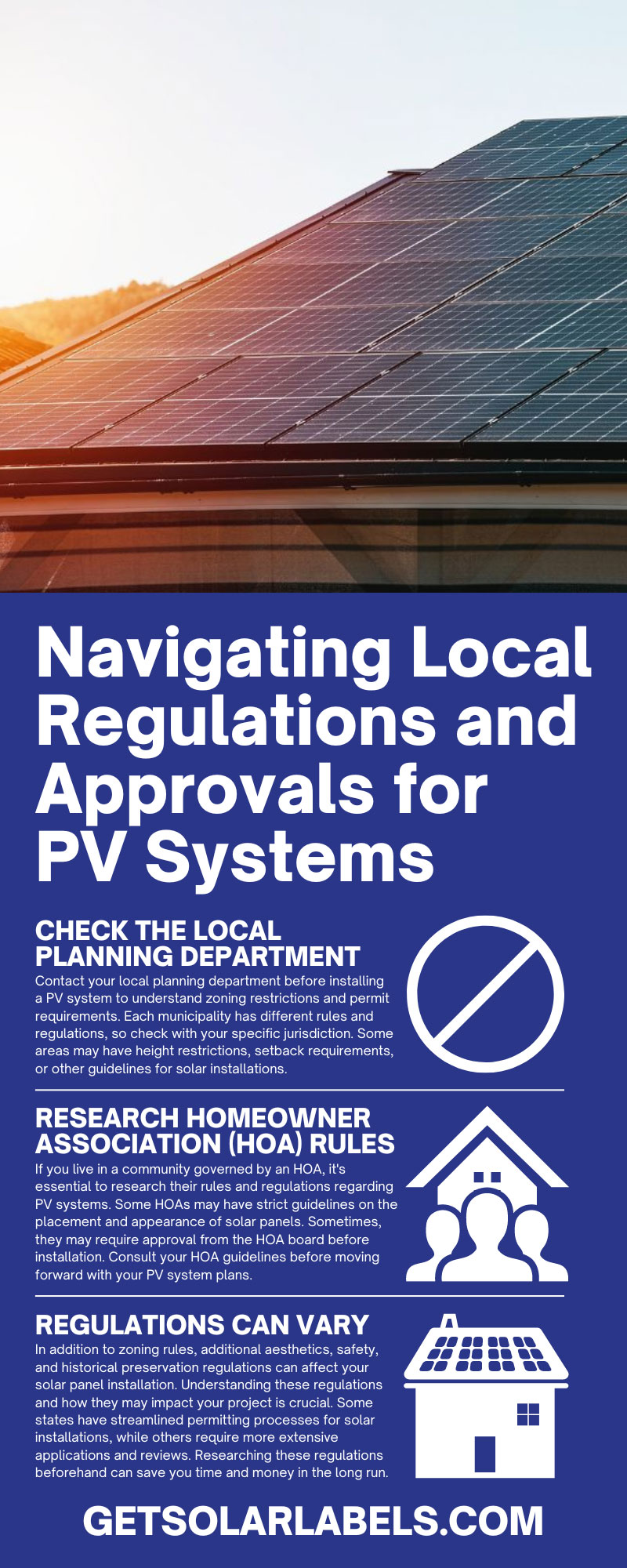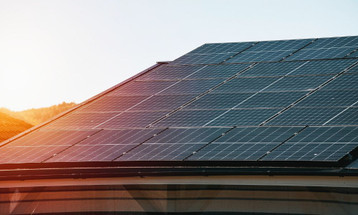Jan 30th 2024
Navigating Local Regulations and Approvals for PV Systems
Solar energy is transforming how homeowners and commercial businesses generate electricity. There's no denying the advantages of photovoltaic (PV) systems for the environment and your utility bills. However, before installing solar panels, buyers and installers must go through the permit and application process to approve their system. Below, we'll help you navigate local regulations and approvals for PV systems by explaining what owners and installers can expect from start to finish of the application process.
Understanding Zoning and Permit Requirements
Check the Local Planning Department
Contact your local planning department before installing a PV system to understand zoning restrictions and permit requirements. Each municipality has different rules and regulations, so check with your specific jurisdiction. Some areas may have height restrictions, setback requirements, or other guidelines for solar installations.
Research Homeowner Association (HOA) Rules
If you live in a community governed by an HOA, it's essential to research their rules and regulations regarding PV systems. Some HOAs may have strict guidelines on the placement and appearance of solar panels. Sometimes, they may require approval from the HOA board before installation. Consult your HOA guidelines before moving forward with your PV system plans.
Regulations Can Vary
In addition to zoning rules, additional aesthetics, safety, and historical preservation regulations can affect your solar panel installation. Understanding these regulations and how they may impact your project is crucial. Some states have streamlined permitting processes for solar installations, while others require more extensive applications and reviews. Researching these regulations beforehand can save you time and money in the long run.
Preparing Permitting Documentation
Gather Equipment and Site Specifications
Gather all necessary documentation for your PV system, including equipment specifications, system size, and site layout. The planning department will need this information to determine if your installation meets local requirements. Some jurisdictions may have specific equipment or system size limitations, so it's crucial to gather this information before applying for permits.
Fill Out Permit Applications and HOA Approvals
If your area requires permits or a homeowner's association (HOA) approval, complete the necessary forms and submit them with the required documentation. Double-check all the information before submitting it to avoid any delays. In some cases, you may need to pay fees associated with permits and HOA approvals.
Applying for the Necessary Permits
Permits Required
Solar panel installations often require building and electrical permits. These permits ensure your PV system is up to code and meets safety requirements. Depending on the size and complexity of your system, you may also need a structural engineering permit. Be sure to check with your local planning department to determine which permits are necessary for your installation.
Timeline
The permitting process can range from a few days to several weeks, depending on the area's regulations and workload. Starting the process early is essential so your installation can stay on schedule. In some cases, permit approval may be required before construction can begin.
Application Requirements
Permit applications typically include detailed information about the system, such as equipment specifications, site layout, and anticipated electrical output. You may also need to provide engineering calculations to demonstrate structural integrity and electrical safety. The local planning department may also require proof of insurance and a signed contract with the solar panel installer.
Factors That Impact the Permitting Process
Several factors can impact the time and complexity of the permitting process for solar panel installations. These include:
Location: Different areas have varying regulations and permit requirements, affecting how long it takes to receive approvals.
System size and complexity: Larger or more complex systems may require additional permits or engineering reviews, which can extend the timeline.
Changes in local regulations: Local regulations and policies can change, impacting the approvals needed for your PV system. This is why thoroughly researching local regulations or hiring a professional installer prior is critical to a smooth application process and installation.
Roofing material: Some jurisdictions may have specific requirements for solar panel installations on certain roofing materials, such as clay tiles or slate.
Historic districts: If your property is in a designated historic district, you may need special approvals and permits before installing solar panels.
Ensure your system meets the requirements and that warning labels are appropriately displayed to minimize issues during the permitting process.
Typical Inspections Required
Electrical Inspection
The electrical inspection is one of the most critical inspections for a solar panel installation. The inspector will ensure that your system meets all safety and code requirements, including proper grounding, wiring, and labeling.
Structural Inspection
A structural inspection may be required for larger or more complex PV systems. A structural engineer will review the design and ensure it can safely support the weight of the solar panels and withstand any weather conditions.
Building Inspection
A building inspection may be necessary to ensure the PV system is properly installed on your property and meets all building codes. This inspection will typically cover roofing, mounting hardware, and associated wiring.
Final Inspection
Once all the necessary inspections have been completed, a final inspection will be conducted to ensure that your PV system meets all requirements and is ready for operation. Upon final approval, your PV system can be activated and generate clean, renewable energy for your home or business.
Working With Your Local Utilities
Another consideration for solar panel owners is the utility company. Solar panel owners and installers also must work with the utility company to ensure a safe connection to the grid and more.
Inform Your Utility
Contact your utility company to inform them of your PV system installation plans. They'll provide essential information related to grid connection and any additional requirements.
Applying for Utility Interconnection
Submit an interconnection application to your utility company. This process ensures your system can safely connect to the grid and synchronize with existing electrical infrastructure.
Applying for Net Metering
If your utility offers net metering, apply for this program to receive credits for any excess energy your system produces. Net metering allows solar panel owners to sell back unused power their panels created to the utility company to receive a greater discount on their monthly utility bills.
Meet Regulations and Approvals With Get Solar Labels Warning Placards
Navigating the local regulations and approvals for PV systems can seem daunting, but with careful planning and attention to detail, you can ensure a smooth process. Compliance with all necessary regulations is crucial for the safety of your solar panel installation. Get Solar Labels can help you ensure your new PV system is up to code and safe with our high-quality engraved solar placards and other warning labels for PV systems. Contact us today to learn more about our products and how we can help with your solar panel labeling needs.


